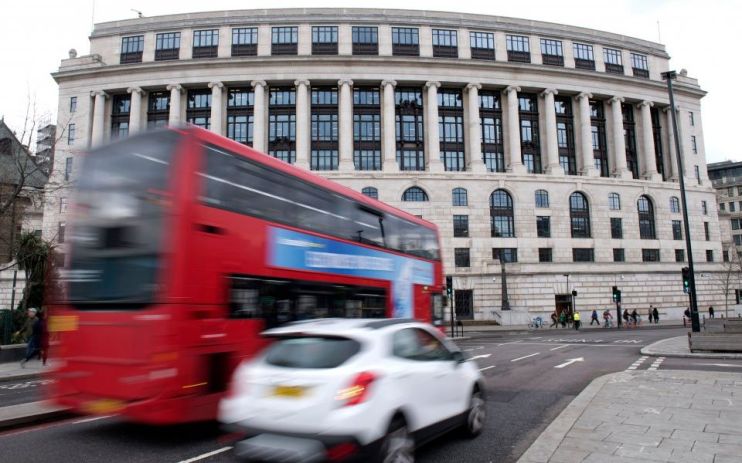Unilever share price dives 7 per cent as £50bn battle for GlaxoSmithKline’s consumer business begins in earnest

The main City story this morning is the £50bn bid by Unilever for GlaxoSmithKline’s consumer healthcare business, of which it owns a 68 per cent stake along with Pfizer, which Glaxo said it had rejected.
“No doubt in the hope that Unilever will come back with a higher offer, with the sum of £60bn being bandied about according to some estimates,” Michael Hewson, chief market analyst at CMC Markets UK, commented this morning.
CEO Emma Walmsley has been under pressure for several months from activist shareholders over her suitability to turn the underperforming pharmaceutical business around.
At the most recent trading update the company said they were laying out a timeline for the sale or spin-off of the consumer business, so that the focus could be much more squarely on its pharmaceuticals business, Hewson said.
View to a demerger
In November, she said progress has continued towards unlocking the value of the business, with a view to a demerger sometime in the middle of this year.
“It seems that the story has moved on since then, with Unilever confirming this morning that it had made a bid, as well as two previous ones, all of which had been rejected by the Glaxo board,” Hewson explained.
He pointed out that shareholders have been showing concern for some time now over the direction of the Unilever share price under CEO Alan Jope’s tenure, which has seen declines of over 10 per cent over the last 12 months and is well off the highs seen back in 2019, 8 months after Jope took over.
Last week, Fundsmith LLP’s Terry Smith accused management of being more interested in virtue signalling than achieving its financial performance targets, which it is currently falling short of.
“While some might say this is a little bit harsh, it is also true that in the case of some of its brands it has become a little too political for some shareholders’ liking,” Hewson said.
“It’s not as if Unilever hasn’t been trying to boost its profitability, selling off the underperforming parts of its portfolio in the last two years.”
Analyst Michael Hewson
Last year the company finally managed to agree a deal to sell off its underperforming tea business to CVC Capital partners for €4.5bn, following on from the sale of its spreads business previously.
“The company has also had to contend with steep rises in costs which have hit its operating margins, although some of the effect has been mitigated by the company raising prices,” Hewson noted.
This was reflected in its Q3 numbers which saw Q3 sales rise by 2.5 per cent, while being able to increase prices by 4.1 per cent, a decent improvement on its H1 performance.
At the time CEO Alan Jope warned that these price rises were unlikely to be one-offs, warning that further increases would probably start to filter through over the next six months to offset the problems caused by ongoing energy price rises and supply chain disruptions, Hewson pointed out.
“We should get more details on how the business has performed in Q4, when the company reports on the 10th February,” he added.
Main rivals
This increase in costs has followed a similar trend reported by sector peers Nestle, and Procter and Gamble, unfortunately for Jope these companies have seen their share prices go up in the last 12 months, while Unilever’s has gone down.
“It seems clear that Jope is coming under pressure from shareholders to deliver a value, as well as a growth proposition to help turn the share price around,” Hewson said.
“A deal between GlaxoSmithKline for its consumer healthcare business would undoubtedly be a good fit for Unilever, and it’s a little surprising that they haven’t ripped Unilever’s arm off at £50bn, as it’s a decent price, with the only question being as to whether it’s the right one,” he analysed.
“It might be for GlaxoSmithkline and Pfizer, however there is a feeling that for Unilever it could well prove to be too high a price,” Hewson continued.
“Perhaps GSK think they can get Unilever to come in with a higher bid, or perhaps get a higher valuation by way of a spin-off?”
This is by no means certain and with the Unilever share price sliding sharply this morning it would appear that the markets have made up their mind, with GlaxoSmithKline shares going higher.
“So far in his tenure as CEO, Jope has done a number of deals since he took over, including buying Glaxo’s Horlicks business in India, however they haven’t really added to the sum of Unilever’s parts when it comes to overall returns.”
“Paying £50bn for a business that sells pain relief products and toothpastes, comes across as a risky bet, and while there appears to be universal consensus that Unilever needs to shake up its business, a near £60bn price tag for doing so seems a little on the rich side,” Hewson added.
“Jope has already made one deal involving the Horlicks name, let’s hope he doesn’t make a Horlicks of this one,” he concluded.